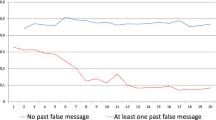Abstract
We analyze experimentally two sender–receiver games with conflictive preferences. In the first game, the sender can choose to tell the truth, to lie, or to remain silent. The latter strategy is costly. In the second game, the receiver must decide additionally whether or not to costly punish the sender after having observed the history of the game. We investigate the existence of two kinds of social preferences: lying aversion and preference for truth-telling. In the first game, senders tell the truth more often than predicted by the sequential equilibrium analysis, they remain silent frequently, and there exists a positive correlation between the probability of being truthful and the probability of remaining silent. Our main experimental result for the extended game shows that those subjects who punish the sender with a high probability after being deceived are precisely those who send fewer but more truthful messages. Finally, we solve for the Perfect Bayesian Nash Equilibria of a reduced form of the baseline game with two types of senders. The equilibrium predictions obtained suggest that the observed excessive truth-telling in the baseline game can be explained by lying aversion but not by a preference for truth-telling.
Similar content being viewed by others
References
Alger, I., & Renault, R. (2007). Screening ethics when honest agents keep their word. Economic Theory, 30, 291–311.
Bolton, G., & Ockenfels, A. (2000). ERC: a theory of equity, reciprocity, and competition. American Economic Review, 90, 166–193.
Brandts, J., & Charness, G. (2003). Truth or consequence: an experiment. Management Science, 49, 116–130.
Cai, H., & Wang, J. (2006). Overcommunication in strategic information transmission. Games and Economic Behavior, 56, 7–36.
Charness, G., & Dufwenberg, M. (2006). Promises and partnership. Econometrica, 74, 1579–1601.
Costa-Gomes, M., Crawford, V., & Broseta, B. (2001). Cognition and behavior in normal form games: an experimental study. Econometrica, 69, 1193–1235.
Crawford, V. (2003). Lying for strategic advantages: rational and boundedly rational misrepresentations of intentions. American Economic Review, 93, 133–149.
Crawford, V., & Sobel, J. (1982). Strategic information transmission. Econometrica, 50, 1431–1451.
Dickhaut, J., McCabe, K., & Mukherji, A. (1995). An experimental study of strategic information transmission. Economic Theory, 6, 389–403.
Ellingsen, T., & Johannesson, M. (2005). Promises, threats and fairness. Economic Theory, 114, 397–420.
Fehr, E., & Schmidt, K. (1999). A theory of fairness, competition, and cooperation. Quarterly Journal of Economics, 114, 817–864.
Fischbacher, U. (2007). Z-tree—Zurich toolbox for readymade economic experiments. Experimental Economics, 10, 171–178.
Gneezy, U. (2005). Deception: the role of consequences. American Economic Review, 95, 384–394.
Green, J., & Laffont, J. (1986). Partially verifiable information and mechanism design. Review of Economic Studies, 53, 447–456.
Hurkens, S., & Kartik, N. (2008, forthcoming). Would I lie to you? On social preferences and lying aversion. Experimental Economics.
Kartik, N. (2008). Strategic information with lying costs (Mimeo).
McKelvey, R., & Palfrey, T. (1995). Quantal response equilibria in normal form games. Games and Economic Behavior, 10, 6–38.
McKelvey, R., & Palfrey, T. (1998). Quantal response equilibria in extensive form games. Experimental Economics, 1, 9–41.
Nagel, R. (1995). Unraveling in guessing games: an experimental study. American Economic Review, 85, 1313–1326.
Peeters, R., Vorsatz, M., & Walzl, M. (2007). Truth, trust and sanctions: an experiment on institutional selection in a sender-receiver game. Meteor-wp 034/2007.
Sánchez-Pagés, S., & Vorsatz, M. (2007). An experimental study of truth-telling in a sender-receiver game. Games and Economic Behavior, 61, 86–112.
Sen, A. (1997). Maximization and the act of choice. Econometrica, 65, 745–779.
Stahl, D., & Wilson, P. (1995). On player’s models of other players: theory and experimental evidence. Games and Economic Behavior, 10, 218–245.
Sutter, M. (2007, forthcoming). Deception through telling the truth?! Experimental evidence from individuals and teams. Economic Journal.
Author information
Authors and Affiliations
Corresponding author
Additional information
Financial support through the Ramón y Cajal program of the Spanish Ministry of Education and Science is gratefully acknowledged. This work was initiated while the author was working at Maastricht University.
Electronic Supplementary Material
Rights and permissions
About this article
Cite this article
Sánchez-Pagés, S., Vorsatz, M. Enjoy the silence: an experiment on truth-telling. Exp Econ 12, 220–241 (2009). https://doi.org/10.1007/s10683-008-9211-7
Received:
Revised:
Accepted:
Published:
Issue Date:
DOI: https://doi.org/10.1007/s10683-008-9211-7




